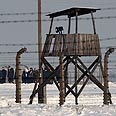Focusing on the ongoing deterioration of Auschwitz Concentration Camp, a recent study conducted by Mrs. Gila Oren from the College of Management Academic Studies in Rishon Lezion, Prof. Yaniv Poria from Ben-Gurion University and Dr. Avital Biran from the University of Surrey in the UK, explores Israelis, Polish and Germans’ attitudes towards the preservation of the camp.
The data was collected from a survey of 310 participants in major cities in Israel, Poland and Germany. In particular, the study attempted to identify financial aspects relevant to the site preservation and, more specifically, which countries should pay for the preservation and how much people are willing to donate for its preservation.
The results highlight that the cost of preservation should be paid mainly by Germany, Poland and Israel. This is particularly interesting because currently Israel does not take part in the financial burden for preserving Auschwitz. The research went further and asked whether people would agree to personally donate to support the preservation of the site.
The findings draw attention to the fact that people from all three nations find it very important to preserve the camp - though Israelis see this as slightly more important than the Polish and the Germans.
The three main reasons given for the importance of such preservation are:
- The site is a proof that Holocaust actually happened
- In memory of the victims
- An "educational tool" for future generations
Additionally, the findings highlighted participants’ positive response towards personally donating towards the site's preservation. The average amount of money people are willing to donate is close to $10. Israelis are willing to donate up to $16, while Germans and Poles are willing to donate $8.5 on average.
The study also explored the willingness to donate with regards to the different narratives that can be presented on site. The findings reveal a major preference towards the narrative that is currently displayed in Auschwitz, which relates to the various victims of the camp. The participants were offered two other narratives. One is a "Jewish narrative" in which the interpretation emphasizes the Jewish victims of the camp. The other optional narrative presents the site as a universal symbol of evil and a memorial for other worldwide events of genocide. These were the least preferred options by the participants with also limited ability to encourage financial support and donations.
The research emphasizes the positive attitudes of all the participants towards the preservation of Auschwitz, both from people who have visited the site and those who have not visited the site or had not been interested in visiting the site. All are very supportive towards its preservation.
The researchers said the study "highlights the importance assigned to preservation of Auschwitz as a means to preserve the historical detail presented there, and its moral lesson for future generation."
- Follow Ynetnews on Facebook
















